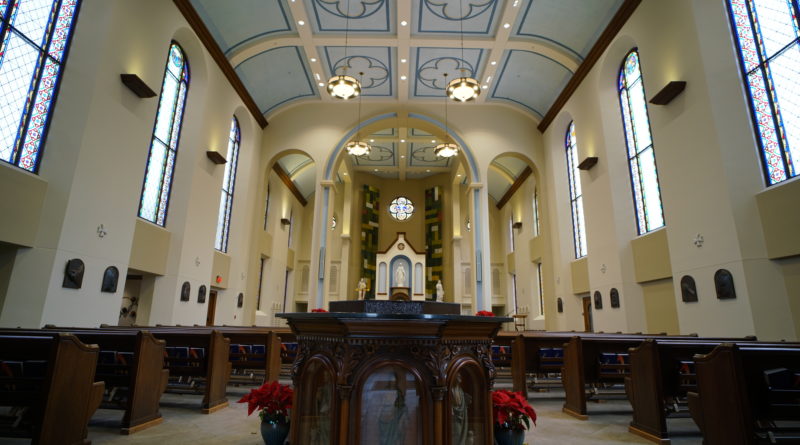OPINION: Universities should be open to discussing women’s healthcare regardless of faith
Photo of the inside of the Chapel of the Immaculate Conception by Zach Merz, Flyer News.
Bridget Graham | Contributing Writer
As a Human Rights Major at UD, I’m often asked what the purpose of a Human Rights degree is. Usually, I tell them that I’m excited by the human part of human rights, and that working in human rights means I get to work with all parts of the human experience.
Through my work in my major and at the University’s Human Rights Center, I’ve learned about migration and refugees, human trafficking, history, environmental movements, anti-racist movements and restorative justice. And more, I’ve met grassroots activists from Kentucky to Guatemala to Hong Kong, and got to see first-hand the impact of changemakers and activists around the world.
I’ve cherished these experiences, which is why I was so disappointed to learn of the UD administration’s choice to disinvite Dr. Tlaleng Mofokeng from speaking at the HRC’s biannual Social Practice of Human Rights Conference.
Having been deeply involved in the past two conferences during my time at UD, I know firsthand the value of scholars, practitioners, and students convening together to talk about human rights, and I know the power of those conversations. Disinviting Dr. T, as she’s more commonly known, deprived all participants of hearing about her work of ensuring the right to health during a global pandemic, one of the most pressing topics facing the international community.
The University disinvited Dr. T on the basis that her “background to work related to reproduction is inconsistent with the University’s Catholic, Marianist mission and identity.” Presumably, this is referring to Dr. T’s past work, which includes projects in gender equality, policy, maternal and neonatal health (including abortion services), universal health access, post-violence care, menstrual health and HIV management.
While I respect the right of the University to promote its own Catholic and Marianist
mission, I do not believe the UD should silence speakers and conversations on this campus simply for having a different opinion or experience.
This action also allows the University to continue ignoring inconvenient realities of the debate and discussion around reproductive rights. The reality is that Dr. T is far from the only expert in healthcare and human rights to support abortion access. Abortion was included in the list of essential care services published by WHO in 2020. 67% of healthcare workers responded to a survey stating in general, they support women’s access to abortions.
The reality is that both health science and international law largely recognize that access to abortion decreases maternal death in developing countries, and even in countries like the United States, access to family planning services leads to increased academic, economic and health outcomes for women.
The reality is that plenty of other universities, even ones that share our Catholic faith, have been able to discuss reproductive rights in classes and guest speakers without the “considerable negative reactions” that the administration feared would disrupt and distract from the conference. Probably because more than half of the U.S. Catholics (56%) said abortion should be legal in all or most cases, according to the 2019 Pew Research Center survey.
As a Catholic myself, I disagree strongly with the idea that Dr. T’s work is inherently inconsistent with the Catholic faith. I think a lot about my faith. I think about things seen and unseen, I think about what it means to take seriously the call to love one another. Usually, I think it means that God wants us to listen. God wants us to listen to the one in four women that will have an abortion. God wants us to radically empathize with the fear around an unwanted pregnancy – whether or not a pregnancy has complications, giving birth will change that person forever, even just in a physical sense. This is not to mention the laundry list of complications that could arise during or after birth: one that could need surgical or therapeutic intervention, or never go away like enlarged veins or postpartum diabetes or chronic pain.
The Catholic, Marianist thing to do would be to listen to the beliefs of those different from ours and try to come to an understanding. The Catholic, Marianist thing to do would be to invite open dialogue around every issue our community faces and not fear backlash.
It is my belief that both at a University and in life in general, people must be free and trusted to decide things for themselves. Students should be allowed to hear from a variety of speakers and choose who and who not to believe. Women should be able to struggle with complex ethical issues and arrive at the right decision for themselves, for their families. We should be able to talk about abortion, reproductive rights, faith, and controversy openly and honestly.
The administration’s choice to disinvite Dr. T denied all of us that opportunity.
For more opinion pieces, like Flyer News on Facebook and follow us on Twitter (@FlyerNews) and Instagram (@flyernews).

